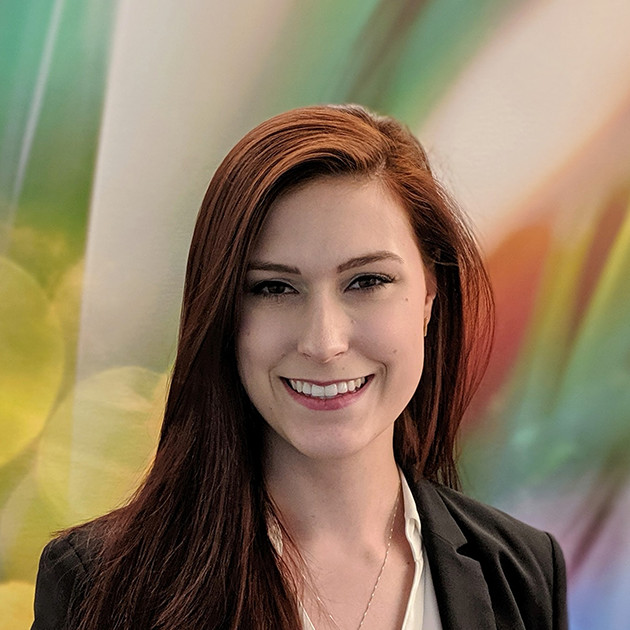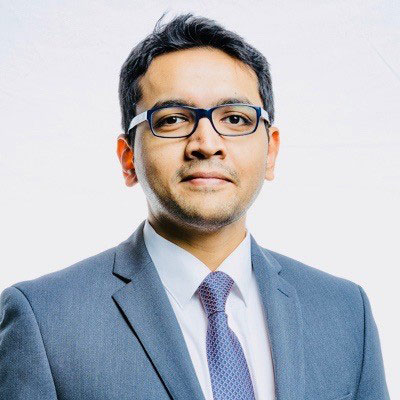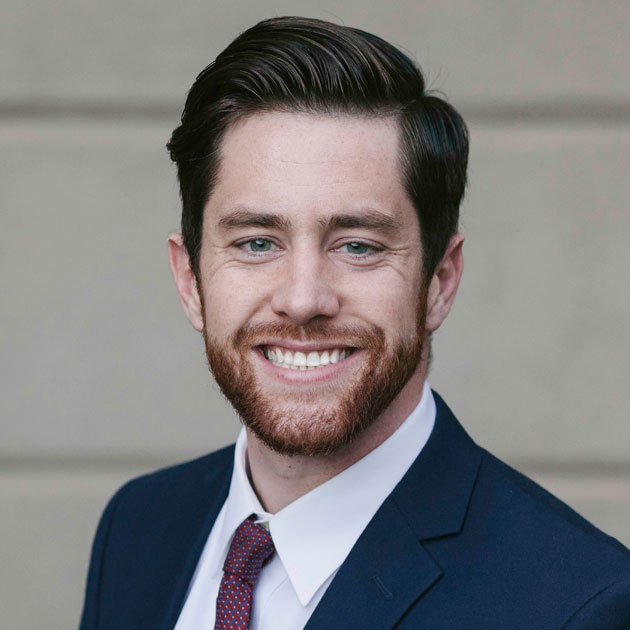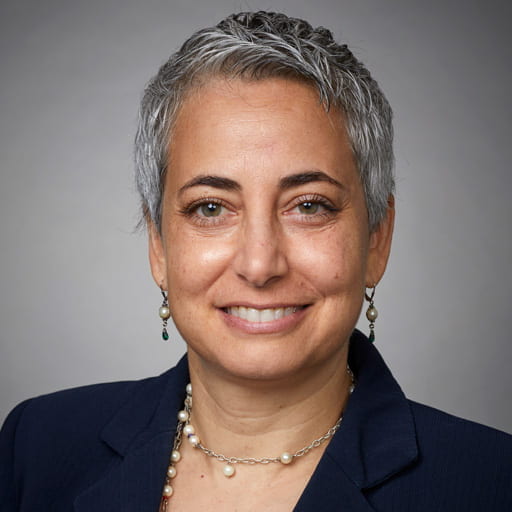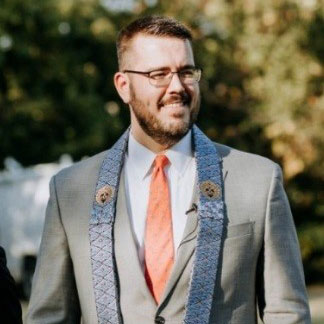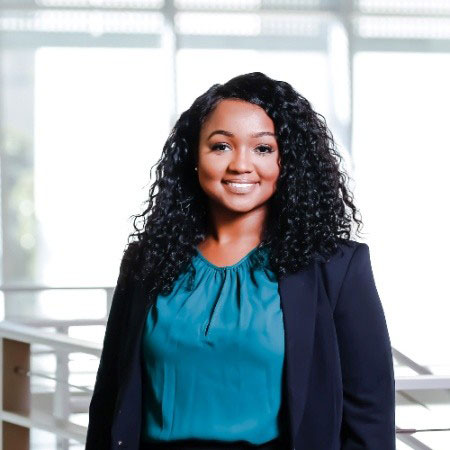
In this episode, host Dr. Monica Powell welcomes Janelle Manuel, MBA’17, MS’17,to the podcast. Manuel, who recently transitioned into a new position, was a senior manager of digital experience at Mohawk Industries at the time the episode was recorded. They discuss how Manuel getting both an MBA and a master’s degree in business analytics at the Naveen Jindal School of Management positioned her for success in the marketing field, which is becoming increasingly oriented on big data.
Transcript
Introductory music plays up through Monica’s introduction.
[Jimmie] This is yet another MBA G.O.A.T. A podcast featuring conversations with the greatest of all-time MBA alumni from the Naveen Jindal School of Management at the University of Texas at Dallas. We are here to celebrate the outcomes of graduate management education and to identify remarkable examples of how the MBA program here at the Jindal School has transformed the lives of our alumni. Now, here’s Dr. Monica Powell, Senior Associate Dean and Graduate Dean at the Jindal School. Take it away, Monica.
[Monica] Well hello there. This is Monica Powell. I’m the senior associate dean and graduate dean here at the Naveen Jindal School of Management at UT Dallas and I am so excited today that we have the opportunity to talk to Janelle Manuel. She is an amazing digital marketing analytics master, a senior manager of the digital experience at Mohawk Industries. She’s living in Atlanta coming to us across the airwaves, and we’d like to welcome Janelle to the MBA podcast.
[Janelle] Hello, Thank you for inviting me.
[Monica] We are so excited to have you. Now, if I remember correctly, we’re talking to you from the lovely state of Georgia.
[Janelle] Correct. I live in the greater Atlanta area currently.
[Monica] Well, we love the fact that, that, that somebody who’s living in Atlanta loves Texas and loves the University of Texas at Dallas.
[Janelle] Oh, yeah, I have so much Comet Pride. I love the school. I love the faculty, and as I was super excited about this opportunity always looking for a way to make sure I stay connected even, even if I’m a little far.
[Monica] Hey that’s alright you can be a Comet from afar and love us just the same.
[Janelle] Exactly
[Monica] So, Janelle, let me ask you just a few questions because you know I looked at your Linked-in profile and I looked at what you have done and of course, you were here in Dallas when you went through the evening program. And, then you have experienced some pretty incredible promotions at Mohawk Industries after you graduated from the program. Can you tell us a little bit about Janelle before the program, Janelle in the program and now Janelle out of the program?
[Janelle] Oh man, okay, sure. Um so, Janelle before the program had been working in marketing for a manufacturer in Dallas. I knew that I wanted to continue my education. You know, I had been out of undergrad for a while, but I wasn’t honestly quite sure where I wanted to go. I knew business. I knew marketing, but I felt like it was so much subjectiveness in um the marketing world that I really knew that I needed to like hone on to some sort of specific marketing-related skill. So, I was the coordinator. You know, what I would really consider an “in” to anybody that you know it’s kind of at that same place. That’s the paying-your-dues base. You know, you are in the platforms. You are in the operations, the day-to-day tasks. You’re trying to familiarize yourself with not only the business, but the tools that the business uses to actually you know get the marketing work done. So, that was definitely what I was doing in the trenches. And then, you know, of course got accepted into um the evening cohort program. It was exactly what I needed at that time because I, I just wasn’t in a place to completely stop working and go to school. But I knew that I wanted something as kind of cohort based and on campus if possible because I knew I needed that experience to really kind of immerse myself in the curriculum. So, getting to the, the cohort. The thing that I would say is the first few weeks it is like blissful unawareness. Like you are blissfully unaware all the things that you don’t know, all the things you’re going to have to call upon from your time working, all the things you’re gonna have to call upon from your time, your time in school before. Um, it’s really kind of familiarizing yourself with the rigor and the kind of connectivity that has to be had to, to really thrive in a program like this. And so, you know really being in that program and getting through that first phase of let me adjust to the workload, let me adjust to, you know, how I’m going to balance my professional career and my student, my career as a student. You know how am I going to do this? And so um, I had to be very up front with my job. You know like, this is, this is what I want to do. I’m wanting to use the things that I’m learning to reinvest um back here at my job, um, but it’s, it’s gonna take me some time, some semesters to figure out that balance. I had a great work environment where they really encouraged me to not only continue my education but also to bring back the things that I learned in um really try to apply them. I think that, that is the best way to learn anything is, you know, take it, absorb the theory, absorb the model, absorb the practicum, but you know ultimately it’s about how you put in practice to really you know move business objectives. So, that was kind of Janelle during this my time in school. You know sorting through all the things that I thought would make me a more well-rounded student, so that was like competing in contests or case studies things like that or you know going to events and networking on top of it really kinda having that full time career that was you know because that was bringing back a lot of things I was learning, I was getting a lot more responsibility and, and you know there were times like, “wow this is a lot”, but you know this is exactly the environment that I need to really kind of sort out how I’d apply these things to my daily life.
[Monica] So, fast forward that to now and how the MBA degree has really helped you grow your career.
[Janelle] My job is very aware that I just, I didn’t want to really making large moves while I was still in school. But, I did not anticipate how quickly things would move once I was done. (Laughed) So, I graduated. I had a, a boss that was very excited about what I could bring because I did concentrate on the analytics track and so she was starting to build a kind of analytics practice within our organization. So, she wanted me to really kind of develop that from inception and so, I ended up relocating to Georgia um where my boss was sitting and um where she worked from. And, you know, relocated, you know got a house and everything and then you know really worked hard at that for two years. Um, helped my boss evaluate platforms, um implementation for um analytics tools, just starting to build a more unified marking data ecosystem for the company in creating ways to really scale that across both sides of our residential and commercial business. So, really focus on that for two years and then internally we just saw that a lot of the digital experience concurrently on the senior manager for digital experience for the residential business. Um, a lot of the digital experience today is powered by data. So, it just seems like the logical next step as we continue to try to build our digital leadership, continue to try to steer toward this digital first mindset across the business unit and so, that, that’s kind of how I ended up where I am today. So, currently, I am responsible for still measuring and tracking our digital channels, measuring across the ecosystem, but also tying that together to create really impactful meaningful digital experiences for our consumers.
[Monica] Wow, that sounds really exciting and you know we, we see a lot of MBAs that want to go into the digital analytics space, and you have absolutely penetrated that and shown the benefit of the MBA on that opportunity. When you think about your experience here because you, you really were enrolled in the toughest of our MBA programs. You were working full time, balancing some kind of a private life and then, you know, being fully employed all at the same time. So, if, if there is a prospect out there that, that’s thinking about juggling all of those balls at the same time, what kind of advice would you give them to make the juggling much easier?
[Janelle] It starts with really defining what you would like to get out of such an undertaking. I knew that when I got out of the and when I came out the other side of the PEMBA or um the covert format, I did want to have those connections. I did want to be able to call on you know members of my cohort you know long after the, the end of, of my time at UTD. Um and, I also knew that I wanted to be able to practically apply it as I was in the program. So, it required lots of studying, lots of the application that you know sometimes your professors when asked for um, you know, especially in the marking analytics track, but it’s, it’s taking that step and actively saying, “okay now that I’ve learned this for school, how do I bring this into the business so I have more practical knowledge?” And, then also just making yourself go to those events, making yourself do the networking because it is very easy to choose to stay home and maybe catch up on a few hours of sleep or you know ah maybe just have some time to you know catch up on your favorite show. But, I think all of it really goes together to really help you, really make yourself a more well-rounded candidate once you finish the program.
[Monica] You know I talk to students at orientation all the time, and I tell them that if you come and you only partake of the classes, then you’re only getting half of what you’re paying for in tuition. That there’s really a networking component. There’s an extracurricular component. There’s a component about moving outside of the classroom and not just focusing on the knowledge, but focusing on the experiences. That it’s a, you know, it’s this great place where you can grow your confidence. You can grow your skills. You can practice. You’re in a safe kind of environment. So, the decision process that you made to come back, you said you kind of thought about, “What do I want to get out of it?” How long did you think about getting an MBA before you actually did it and was, was just kind of was the process hard or was the decision hard or was it all of it?
[Janelle] So, the decision to get the MBA was, was not hard. Once I decided break, you know, marketing is going to be my career. I want to grow in this. I, I think that this is something that really I could see myself doing long term. I knew the MBA was the next step because that you know I knew I wanted to be client-side corporate. So, there were things about the business that I needed to know. Um, now, the analytics track actually kind of came organically just from a little bit of just what I was doing before I started out. Like I actually really liked this. I could see myself really going down this path, but it, it wasn’t really a hard decision to get the MBA, but the process of deciding where to go, what program, what format was going to be best for me to finish the program with what I felt like I needed to really accelerate. That was a lot more tedious, um, because you, you know you’ve got to talk to people who’ve gone through it. You’ve got to start going to the events. You’ve got to, you know, get some face time with professors. I think probably one of the best things I gave myself was one of the um PEMBA information sessions. They had a professor speaking, and you know I just struck up a conversation, which is not like me. I’m, I’m, I really don’t consider myself one of those like kinda you know very good on demand people, (small laugh) ah, but um, you know I think that was such a defining moment just talking about like you know how these professors worked in the real world. They, they understand that it’s, you know, all of the business models, it’s good to know them, but it’s still going to require a little bit of just nature and just kind of experience to really make those key business decisions. So, um it was, it was good. I felt like it was and especially the, the people the more I got to learn about the people that were wanting, interested in the cohort. You know, these are people in the field. These are people actively working, um not necessarily afraid of sharing resources and things like that. I thought all that was critical in, in and that was what (music begins) led me there made you know. But, it the process itself was pretty tedious, but they’re definitely worth it and I highly recommend that same due diligence for sure.
[Monica] Wow, it sounds like you had a great plan.
[Jimmie] This episode is brought to you by the UT-Dallas MBA program, top-ranked nationally and in Texas. The UT-Dallas MBA combines a robust core with 13 concentrations. You have an option to add a second Master’s degree and your choices for that include five STEM designated programs. The MBA program has fulltime, part-time, online and other formats. They give you flexibility to fit your MBA education into your busy schedule. The skills and training you will receive are what top employers are looking for. For more information, visit us online at jindal.utdallas.edu/mba.
[Monica] If I remember correctly you, you did the MBA, but you also added on the full MS for the business analytics degree?
[Janelle] I did. I did. I don’t know how I talked myself into that one, but I did do that one and you know (music faded away) I felt like because of, of where the, the technical demands that were starting to do to be more apparent for marketers um, that, that was the logical choice to make sure that there was a great, you know, real technical foundation. A lot of this stuff you’ll learn in the individual platforms, but understanding statistics, understanding modeling, understanding all the things that eventually marketers, you know, and currently marketers are responsible for. We’re, we’re moving further and further away from descriptive or go with your gut where, we’re fully into the predictive phase right now of customer segmentation and customer action. So, I knew that, that would really help me accelerate by understanding those things and, and being able to articulate those to data science teams or to internal B.I. teams.
[Monica] You do realize, Janelle, that you did the hardest combination in the MS/MBA offerings? You did the MBA, which is hard enough when you’re working full time and taking a full class load, but to add the MS business analytics onto that, I mean, you really like to be challenged at the highest level.
[Janelle] (laughing) I, I. think it, you know going into it, it was that the genuine curiosity of like I, I know a little bit about a lot and I’d like to go deeper, I’d like to feel confident speaking about these things. You know. I re, again you don’t realize how much you don’t know until you’re in it and you’re like “wow” this is just so much content, but it is crazy that this is what you know is the gonna be the expectation of businesses in particular marketers as time and technology continue to go on.
[Monica] It’s really interesting that you say that. My Master’s degree is actually in advertising, which a lot of people don’t know that, but you know advertising in those years wasn’t analytically driven. It was all concept. It was all creative design. It was all you know how do you figure out what you think you know about the consumer, so that you can make a pitch to that type of consumer to get them to do something. But, I mean you’re talking about where data drives every single decision and the classes you took helped you to have that conversation with the data scientist, so you can measure the things that tell you how to market effectively to them. So which was the analytics course or which was the marketing course that you continue to go back to in your career day in and day out that you kind of reference as kind of a, a bench point that helps you in your career?
[Janelle] So, there was a course specifically dedicated to marketing analytics. So it was um, his name was Jordan and he was actually the director of analytics at Southwest Airlines, and he was the professor. And, he had so many resources about how companies are using really digital touchpoint data to start to really power customer segmentation and I think that was really what laid the foundation for a lot of these other more really kind of technical or statistics heavy courses. Because you always knew that like there is a customer profile, a customer segmentation, customer behavior kind of mechanism or lever that is going to be polled by these market institute models and he was aware of both. And, so it made that class a lot more substantial because you, you got to see both sides. He threw us right into the platform form of Adobe analytics which is what I implemented at my current company, but didn’t force us, but politely, ah pushed us into participating into the Adobe competition which I did. I did two times, and I actually ran into the sponsor for that competition at several Adobe events, and I always tell them like how critical stuff like that was to kind of determining, you know, the kind of the tools that marketers take to really power that. So, I would say that class was really the foundation um and then I would definitely say all of my regression classes. I would say Mike Brigsby, one of my favorite professors at UTD. I took both of his marketing model classes and I still have both of those books on my desk. He wrote the books for both of the classes then, even though we, we don’t use that at my current position, just a lot of the principles and a lot of the stances on customer segmentation that he took still prevail today. The way I talk to the advertising vendors our media vendors in general, a lot of that still draws back to these kind of segmentation principles that are based on statistical packages
[Monica] Wow, I love both of the things that you said about Jordan and ah Mike Brigsby, and I will definitely tell him that you have two of his books still sitting on your desk. (Janelle laughs) Now, you sound like you get very excited about all things analytics, which I think is absolutely great. I wouldn’t necessarily recommend that you do that at the PTA meeting or, or when you’re socializing, but, but we love in the graduate management education world when students are as excited about analytics as you are because analytics is everything. It’s driving all business decisions today, whether it’s marketing specific or whether it’s production in operations or whether it’s information technology. You can’t do it without data and you can’t make a decision that isn’t data based. So, I’m thrilled to hear the excitement in your voice when you talk about the impact of the MBA and the MS in business analytics on your career. That’s really exciting! So, so you know now that you’re done with it and you’re out there and you’re, you know living this great life and you can look back on these kind of defining moments in your journey here, what would you say to a prospect? What would be the, the biggest selling point that you would say to somebody else who doesn’t yet know they’re madly in love with the data? But, that data might transform their life and they should think about doing what you did. You obviously thought about it a long time, but there’s a lot of people out there that aren’t as decisive as you are. So, what would your advice to them be?
[Janelle] My advice is, if you have a natural curiosity for how things are powered, how things move, how to get people to behave in a certain way, even if you’ve never touched any of the data platforms you’re probably you’re probably well fit to be a data practitioner. Um, I think that half the battle is just the curiosity that is required for you to be able to look at complex datasets and derive insight, and people tend to think that that is a, a wall. That if, if I don’t know how to use Excel in an advanced way, if I don’t know how to use SAS, if I don’t know how to use Adobe and that’s not really for me. But, it really, what marketing needs today are people who understand the principles and people who can apply that critical thinking to datasets to draw insight. So, if you’re naturally analytical, if you’re naturally able to draw conclusions based on the things you learn. I say go for it because that’s where everything is going. Marketing is so full of data practitioners and a lot of people that has been in marketing for years are starting to have to really familiarize themselves with the language of data and familiarize themselves would have hypothesis testing, with A. B. testing, with being able to manage a body of testing which is currently what we’re undergoing. And so, really I say, expose yourself to even the simplest form of it, and if it’s something that you’re able to find enjoyment in and find that natural draft if they let me keep digging deeper, let me keep trying to figure out. Like what this piece of information is telling me. I’d totally recommend it because it puts you in so many places. It puts you in so many rooms that you as an outsider, you don’t really realize how much data really bleeds itself into all the functions of the business. And so, having that at your fingertips and being able to manage that part of the business it is critical. So, I would say if that where your interest lies full speed ahead.
[Monica] Wow, that is a great testimony about why investing in an MBA and an MS in business analytics pays off. So, I want you to finish this sentence for me ah, Janelle. By the time I was done with the end of the evening cohort MBA and MS in business analytics I consumed blank number of cups of coffee.
[Janelle] Actually, probably like 8. (laughing)
[Monica] Wow, so okay, so in in lieu of coffee, Janelle, what did you consume to get through the program?
[Janelle] Copious amounts of energy drinks. (Laughing)
[Monica] So copious amounts.
[Janelle] And, that was diet (Still laughing)
[Monica] So can you, can you, put that
[Janelle] Um, ooo
[Monica] In data terms?
[Janelle] Probably, four a week I did it for 2.5 years. So we’re thinking, oh goodness now like,. (laughing) doing math on the spot when um. 500, about 500 energy drinks. Coffee just like threw me, me straight off the rails and it was just a, a sad sight to see. I don’t know what it is about coffee and my, my kind of internal composition, but I had to go to a different source of energy. So, it was definitely energy drinks for sure which you know I’ve, I’ve weaned myself off the stuff now, but it did take some time. (ha)
[Monica] Well, I absolutely love that answer. So, what was the, what was the high point in the MBA program and what was the low point? And, start with a low point first.
[Janelle] The low point in the MBA program was, oh man, ah so it was ah submitting for the Adobe analytics competition. Ah, we were in the final hour. It was my team. I was also still enrolled in Mike Grigsby’s class, which is always a fun thing to do. And so, I had my ah weekly submission for his class that was going to do very soon, and then I also had to catch a plane in two hours to go to New York for a meeting, and I was just tired. I was having to juggle everything. I was like I am so close, but this is starting to beat me down and um you know, it had to be a lot of positive self-taught, calling my Mom you know in the middle of the night, “Hey you got to give me some words of encouragement because this is, this is becoming a lot.” But, I came back on the other side and handed him my, my submission and went home and slept for like 13 hours. I don’t know about the answer you’re looking for, but that was definitely one of those my most memorable like goodness moments.
[Monica] You know I think that’s a great story, and I think that’s a very realistic experience that a lot of students have. But, isn’t it joyful to be on the other side of it? And say, “Wow, I did it!”
[Janelle] Definitely, all those sessions of trying to retain things, trying to make sure that you know the thing that you are proposing makes sense and trying to make sure that you know that you’re not kind of ah just being in your own bubble and still allow yourself to be inspired in to, to learn new things even in the thick of it. It’s all critical and it’s all still things that I call upon today. The biggest thing that I took for my MBA is that you cannot boil the ocean, but you do need to make sure that you know what you’re talking about. And so, being able to research things quickly, being able to find credible sources quickly, being able to solve problems quickly. All seemed all the muscles that I had to work daily as I was pursuing my MBA, and it still is paying off today, for sure.
[Monica] That just makes me so excited. You know, when I get to chat one-on-one with students and talk about students who’ve really transformed their lives and this, these two degrees have really transformed your life. And I know that Mohawk Industries is absolutely delighted with the outcome. They’ve been a real beneficiary of your investment of time, energy, money, a ton of energy drinks about 500 of those. Um …
[Janelle] (laughing) Yeah.
[Monica] It’s, it’s really paid off. So, let me see if I can ask you some rapid-fire questions here at the end. Let’s see, let’s see how quickly you can throw answers back at me. So, um
[Janelle] ok
[Monica] So, um, what was your favorite class in the MBA program?
[Janelle] My marketing analytics class
[Monica] What was your least favorite class in the program?
[Janelle] Oh man, statistics, the, the first statistics class in the MBA. (laughing)
[Monica] Don’t feel badly. Most people give that same answer. Um, (Janelle laughing) What was the, what was your go-to food?
[Janelle] Ah, Jason’s Deli in, in the business school. (Janelle laughing)
[Monica] A lot of students outside of Jason’s Deli. We won’t ask you what type of sandwich or salad. If you could, if you could do one thing all over again, what would it be and why?
[Janelle] It would probably be my statistical, re my macro, oh jeez, just because I’m trying to say it, it was, it was a class that was very ah statistics heavy and I, I, I devoted my course work I think a little bit improperly for that class. And I just, I struggled with that class. It was a class that I wish I had more time to dedicate to and I just could not. Um, I still have the books this day. I’m trying to blank on the name of the class, but it was it was such a, such a great class, but it was just I was ready to graduate, and I just needed to get these classes down and, and if I just had an extra semester I would do that class all over again.
[Monica] Oh wow, hindsight is always 20/20. So, you’re in, you’re in Atlanta and, and your alma mater is back here in Dallas. So, I’d like to kind of conclude our podcast and you have absolutely been a fabulous Greatest of All Time alum and we’re so grateful that you were here with us. But, I want to know what you are saying to your new colleagues in Atlanta about your graduate management education here in Dallas? And, what would you say to them that would surprise them?
[Janelle] It’s funny because like when I first came to Atlanta, my boss at the time would introduce me like, “Hi, this is Janelle. She has to two de, two master’s degrees.” (Small laugh) And, so, I, I didn’t want that to come across as like you know, this is me and I am other. So, I did want to make sure that I was immersed in working alongside everybody just to make good marketing decisions every day. But, I would, I would often get questions about: Why? How did you do it? Are you just an over-achiever? Are you just someone who you know really likes school like? Like, what makes you different? And, I think that today, you know, when I say to them like honestly it was the best decision I could’ve made because now I know so much about how to relate the thing that I would do personally to the rest of the business and I think that they see it and they understand that it was not just to kind of get some notches, but it was to really make sure again going back to that I know what I’m talking about. And I think that they feel it I feel it when I walk into a room and I’m able to stay with you know to say with surety that this is how we’re going to solve this problem today. That would be what I was saying to them is just this was done so that I could really have that confidence.
[Monica] Well, Janelle you, you impressed me beyond imagination and we are so proud of how you’ve been able to harness this amazing educational opportunity and parlay it into this -confident, excited, analytically rich thinker of an individual who’s out there really showcasing to the world the impact of the UT Dallas MBA and MS programs on an individual We’re, we are really proud of you and we’re grateful that you would take time out of (music begins softly) what, what I know was a really busy schedule to, to chat with us on the podcast and, and we hope you’ll come back to Dallas and visit us again soon and share all of those excellent accomplishments with us. We want to really celebrate and share in your success and we’re grateful for the time that you spent with us, and we really hope you’ll come back.
[Janelle] Thank you.
[Monica] Thanks, Janelle, We’ll be in touch with you again soon.
[Monica] Thank you so much for listening to today’s podcast I hope that you were inspired by the words you heard from one of our Greatest Of all Time MBA G.O.A.T.s . If you were inspired to think about getting an MBA degree, I hope that you will be in touch with us. Give us a call, drop us an e-mail, hop on our website. Be in touch with us so that we can help you make a difference in your future. We look forward to hearing from you.
[Jimmie] Thanks for listening to this episode of yet another MBA G.O.A.T. podcast. Join us online at mbagoat.com to find episode notes, links and more. Be sure to subscribe to yet another MBA G.O.A.T. podcast on Apple podcast or your favorite podcasting app. If you like what you hear, please leave us a five-star review. That will help spread the word about the podcast and Jindal School’s MBA programs. To learn more about the Jindal School’s MBA program, go to jindal.utdallas.edu/mba. (Music continues.)

